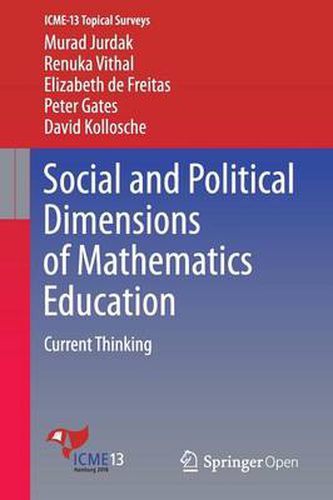Readings Newsletter
Become a Readings Member to make your shopping experience even easier.
Sign in or sign up for free!
You’re not far away from qualifying for FREE standard shipping within Australia
You’ve qualified for FREE standard shipping within Australia
The cart is loading…






This title is printed to order. This book may have been self-published. If so, we cannot guarantee the quality of the content. In the main most books will have gone through the editing process however some may not. We therefore suggest that you be aware of this before ordering this book. If in doubt check either the author or publisher’s details as we are unable to accept any returns unless they are faulty. Please contact us if you have any questions.
This book examines the current thinking on five critical social and political areas in mathematics education. It focuses on material conditions in teaching and learning, and details features of social life and their influence on mathematics teaching, learning and achievement. Following an introduction, the first section addresses equitable access and participation in quality mathematics education. It explores this issue in different contexts and from different ideological perspectives. The second section traces the emergence and development of the notion of activism in mathematics education in theory, in the literature, in research and in practice. The third section then moves on to explore current research on the political forces at work in identity, subjectivity and (dis)ability within mathematics education, showing how emphasis on language and discourse provides information for this research, and how new directions are being pursued to address the diverse material conditions that shape learning experiences in mathematics education. Economic factors behind mathematics achievement form the topic of section four, which examines the political dimensions of mathematics education through the influence of national and global economic structures. The final section addresses distribution of power and cultural regimes of truth, based on the premise that although often deemed apolitical, mathematics and mathematics education are highly political institutions in our society. The book concludes with a summary and recommendations for the future.
$9.00 standard shipping within Australia
FREE standard shipping within Australia for orders over $100.00
Express & International shipping calculated at checkout
This title is printed to order. This book may have been self-published. If so, we cannot guarantee the quality of the content. In the main most books will have gone through the editing process however some may not. We therefore suggest that you be aware of this before ordering this book. If in doubt check either the author or publisher’s details as we are unable to accept any returns unless they are faulty. Please contact us if you have any questions.
This book examines the current thinking on five critical social and political areas in mathematics education. It focuses on material conditions in teaching and learning, and details features of social life and their influence on mathematics teaching, learning and achievement. Following an introduction, the first section addresses equitable access and participation in quality mathematics education. It explores this issue in different contexts and from different ideological perspectives. The second section traces the emergence and development of the notion of activism in mathematics education in theory, in the literature, in research and in practice. The third section then moves on to explore current research on the political forces at work in identity, subjectivity and (dis)ability within mathematics education, showing how emphasis on language and discourse provides information for this research, and how new directions are being pursued to address the diverse material conditions that shape learning experiences in mathematics education. Economic factors behind mathematics achievement form the topic of section four, which examines the political dimensions of mathematics education through the influence of national and global economic structures. The final section addresses distribution of power and cultural regimes of truth, based on the premise that although often deemed apolitical, mathematics and mathematics education are highly political institutions in our society. The book concludes with a summary and recommendations for the future.